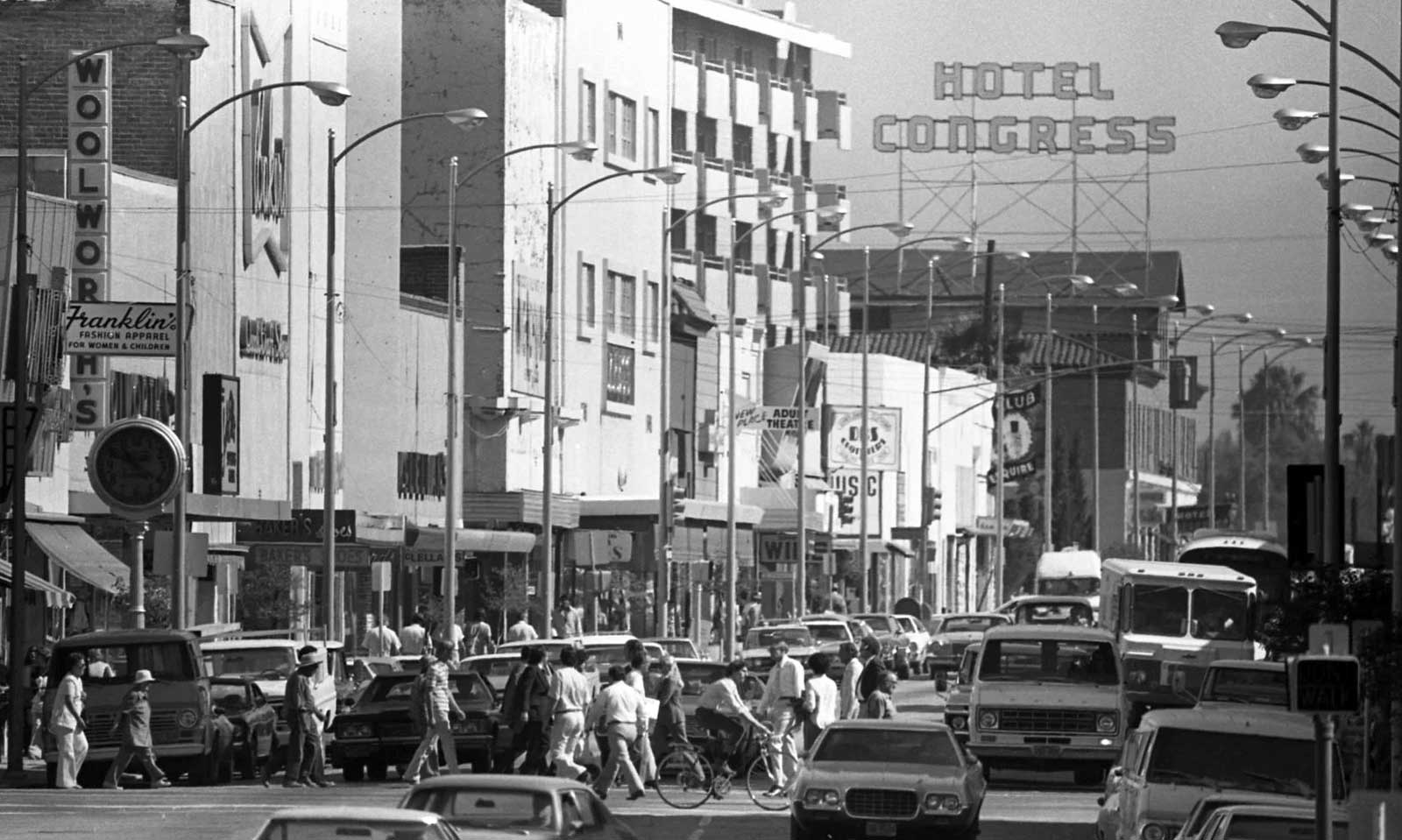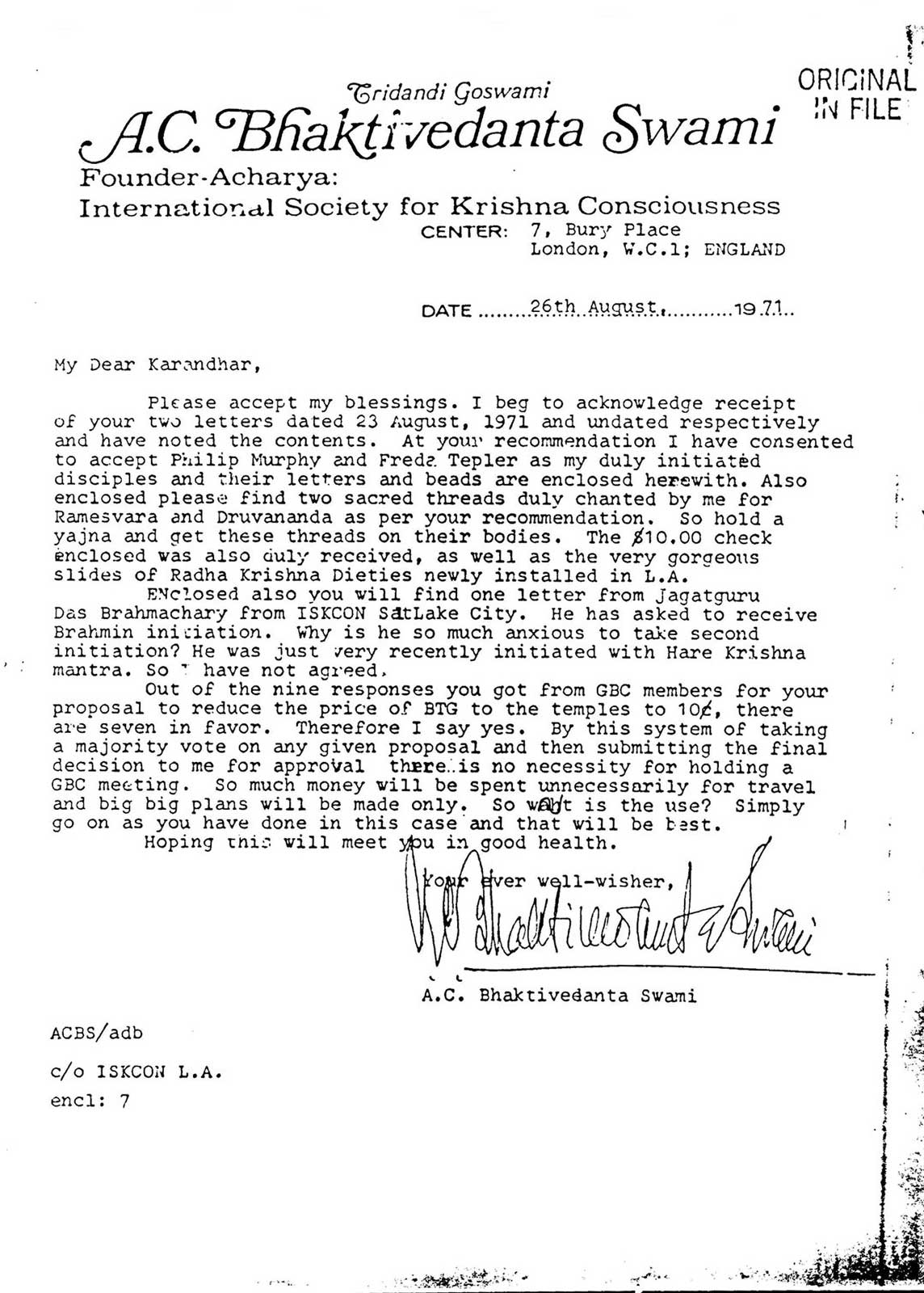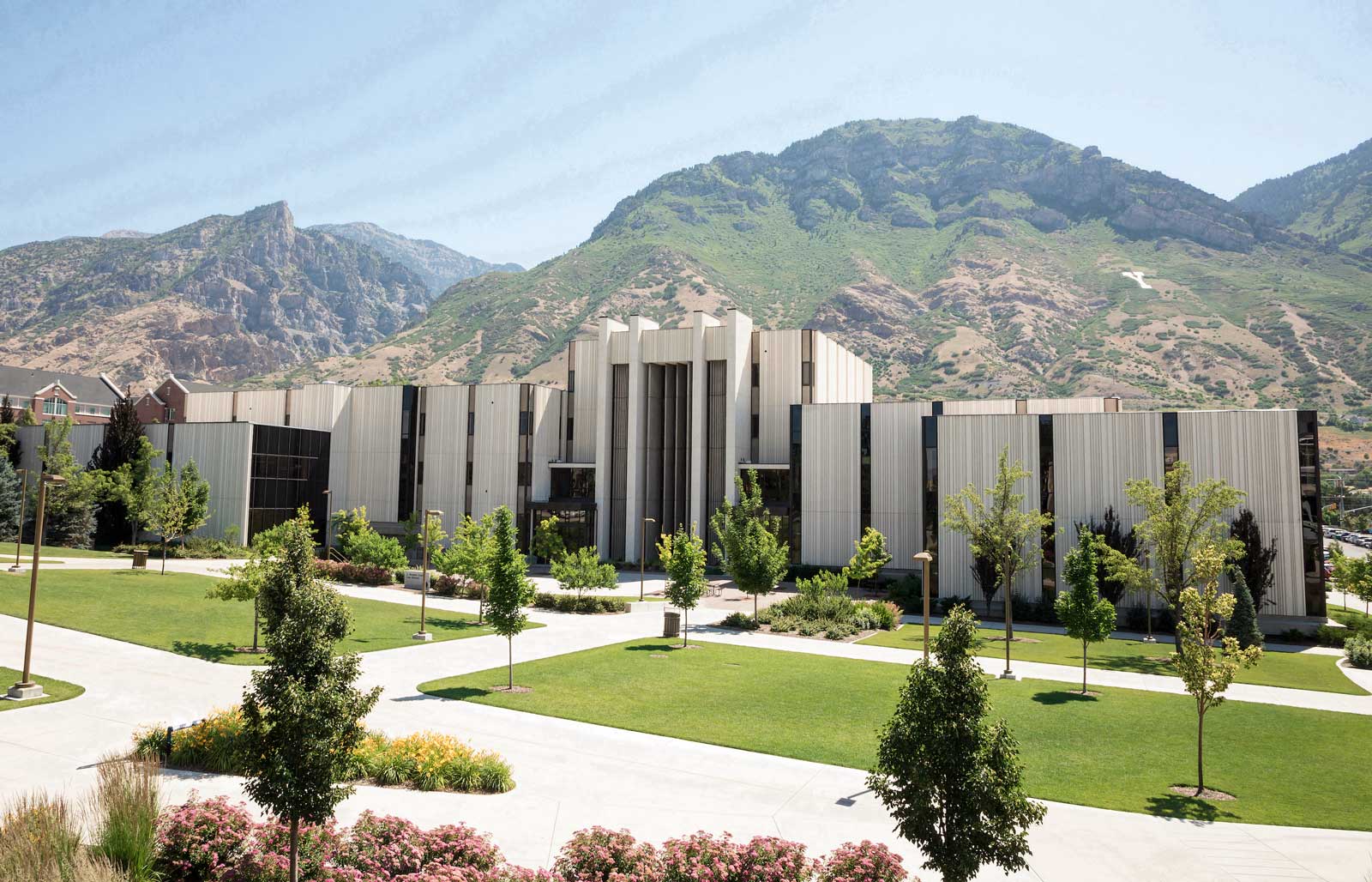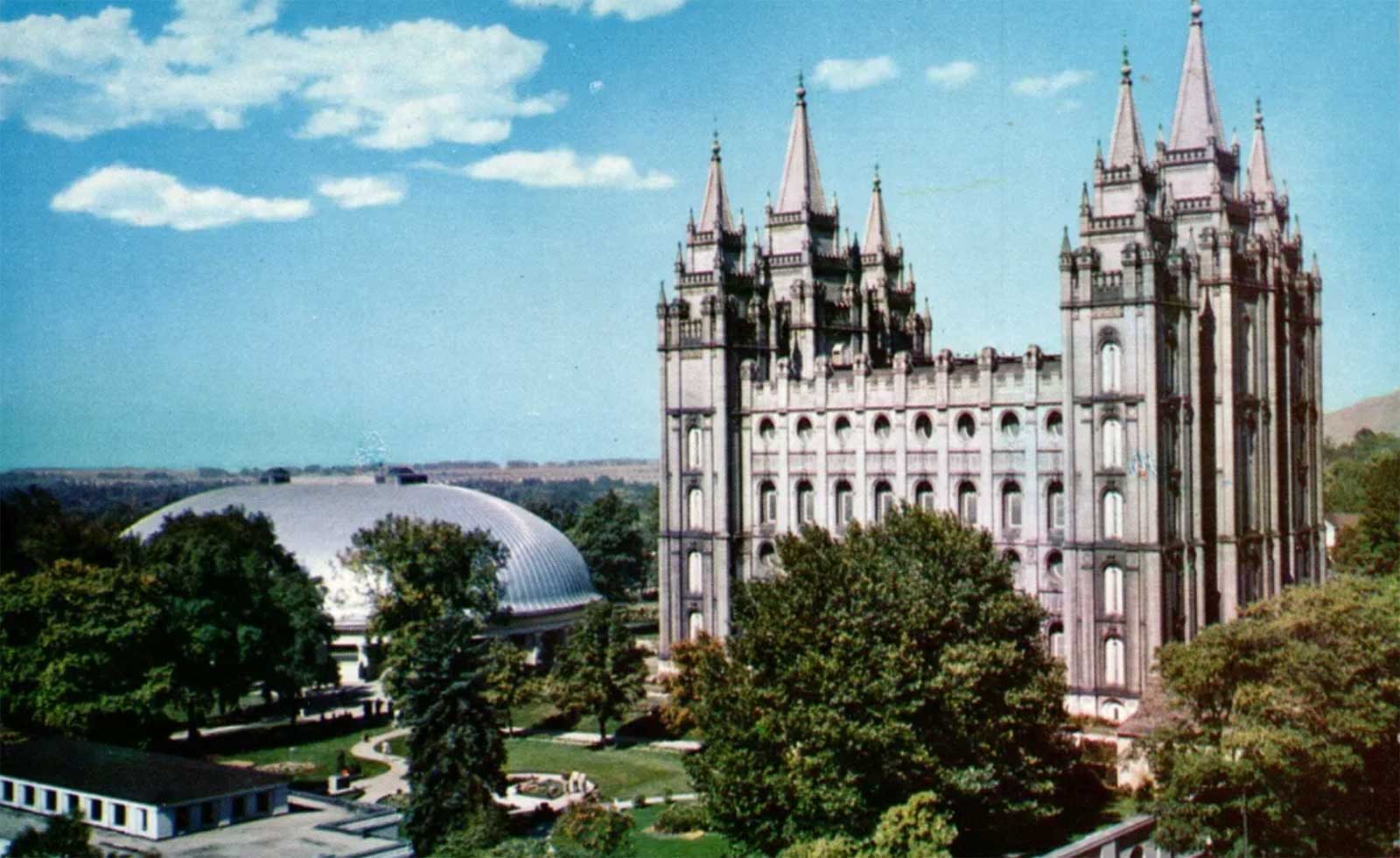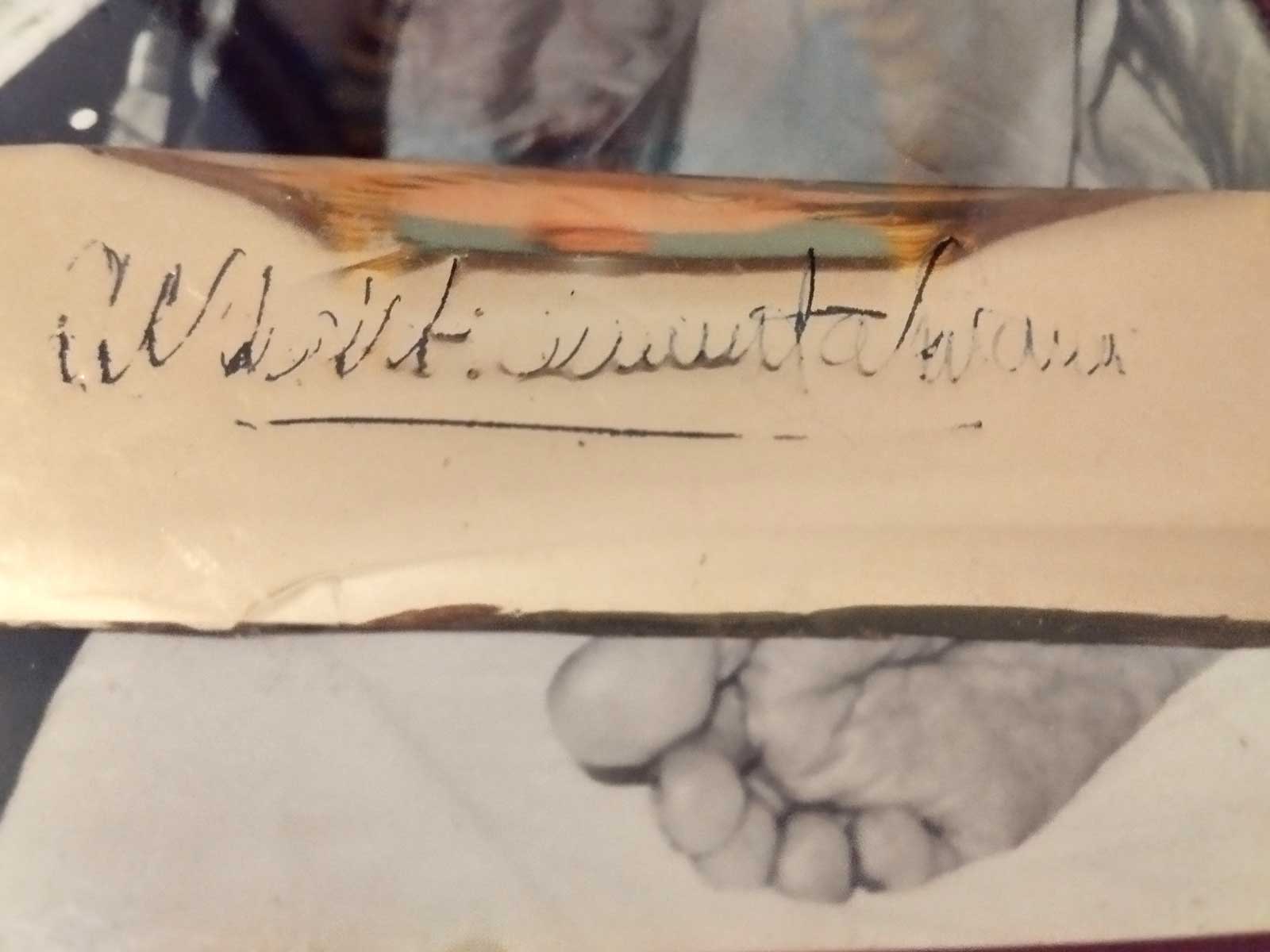Ācārya Siṁha
The Life of Swami Bhakti Gaurava Narasiṅgha Mahārāja
Chapter 10 – Cracked Feet, Christians, Courtrooms and Coups – Back in Salt Lake City
(1971-1972)
Summer in Tucson is not only uncomfortable – it can be dangerous.
Narasiṅgha Mahārāja remembers that the highest temperature recorded when he was there in July 1971 was 108 degrees, which despite the auspicious number, was decidedly inauspicious for the devotees out on saṅkīrtana. The blistering heat was so unbearable that finally, Śukadeva wrote a letter to Śrīla Prabhupāda asking him what they should do. Śrīla Prabhupāda replied that if it was too hot to go on saṅkīrtana, the devotees could stay in the temple all day and read his books.
(Tuscon Arizona in the 1970s)
In August, Śukadeva also received an urgent request from Karandhara in Los Angeles about the situation in the Salt Lake City temple. Two devotees, Janaka Ṛṣi and Śrīvāsa, had left and now Patraka only had three devotees – Kaṁsāri, Narada Muni and Gopa-Gopeśvara. Karandhara asked Śukadeva if he would send Mahārāja and when Śukadeva asked Mahārāja to go, despite his previous experience at the Salt Lake City temple, he immediately agreed.
Narasiṅgha Mahārāja: That was our training. If a volunteer was needed, we immediately stuck our hands up. You didn’t even ask for what. Why? Do you have to hear what it is first to see if it suits your conditions? Besides, Tucson was over 100 degrees at the time, so I decided to give Salt Lake City another shot.
Previously when Mahārāja was in Salt Lake City, he was a brand new devotee, only a few weeks in the movement. The living conditions in the temple had been shoddy, the prasādam situation was insufferable and there was the additional difficulty of working under Patraka. Of course, things were different now. Now he was first initiated. But Patraka was the only devotee in the temple with second initiation, which meant that everyone under him was still forced to accept his authority.
With this in mind, before leaving Tucson, Mahārāja decided to jump the gun and level the playing field a little by writing a letter to Śrīla Prabhupāda requesting second initiation (even though he had just accepted first initiation a month before). After a week or so, a response came, but not the response that Mahārāja was expecting or hoping for. Śrīla Prabhupāda had forwarded Mahārāja’s letter to Karandhara in LA with the following question:
Enclosed also you will find one letter from Jagatguru Das Brahmacari from ISKCON Salt Lake City. He has asked to receive Brahmin initiation. Why is he so much anxious to take second initiation? He was just very recently initiated with Hare Krishna mantra. So I have not agreed.
(Letter to Karandhara, 26th August 1971)
(Śrīla Prabhupāda’s letter to Karandhar regarding initiations)
“Oh well,” thought Mahārāja, “It was worth a try.”
When Mahārāja arrived in Salt Lake City in September, he was pleasantly surprised to see that there was now a new temple. Patraka was renting an old church which had a spacious basement, a good kitchen and much better living facilities for the devotees. He was still tight when it came to spending money, but when Mahārāja arrived he noticed the over-abundance of fruit trees in people’s yards during that season. He and the other devotees would go door to door asking for fruit, and generally people were happy to oblige them – otherwise it simply fell to the ground and made a mess. Eating therefore was not an issue this time round – at least while there was fruit available.
In the next few months, Mahārāja and the devotees would do hari-nāma saṅkīrtana and book distribution every day on the streets.
Narasiṅgha Mahārāja: Viṣṇujana Swami and some devotees had started travelling saṅkīrtana in Texas in late 1970 or early ‘71. I still remember the stories – they were shared via mail with Patraka. I remember him reading how Viṣṇujana had taken a month off saṅkīrtana, and I was like, “What? He didn’t go on saṅkīrtana for a month?” At that point, with the exception of the pūjārīs, there was nobody who didn’t go on saṅkīrtana. That’s all the movement was about – going out and chanting.
Big book distribution came a little later. In the early days, we were mostly distributing Back To Godhead magazines and Spiritual Sky incense. When I was at the first temple at Salt Lake in 1970, we had all these Kṛṣṇa Books that LA had sent to us. There were so many that they filled up the entire prasādam hall – we had to take prasādam in the hallway or in the office. I can remember the devotees standing around asking, “What are we supposed to do with all these books?” There were only four devotees in the temple. What could we possibly do with all these books? At that time, the main thing was worshiping the Deity and chanting in the streets. It was inconceivable how we would take such a big book – and not only that, three of them – and go out and sell them for five dollars each or something.
Book distribution had sort of been going on since 1970, but it really took off in 1971 and early ‘72. I remember in early December of 1971 I sold a complete set of Prabhupāda’s books to a bookstore – Bhagavad-gītā, Nectar of Devotion, Teachings of Lord Caitanya and the Kṛṣṇa Book trilogy. I remember that clearly because it was the appearance day of Śrīla Bhaktisiddhānta. That’s what we did at first – we sold books to book stores and libraries. Then one devotee from San Francisco, Buddhimanta, began selling books to individuals on the street and it was very successful – that’s when book distribution really took off. It spread from San Francisco, to LA, to San Diego, to Denver, and our devotees in Salt Lake City also started.
Apart from street saṅkīrtana, the devotees also preached to students at various university campuses in Utah.
Patraka Dāsa: In Salt Lake, we did preaching programs at the University of Utah, and then at other local universities in Ogden as well as Logan, UT. At these events Mahārāja would go into classrooms and eruditely expound on Vaiṣṇava philosophy, taking to task any of the students who wanted to refute what he was saying, yet doing it in a manner that convinced them that he truly cared for their well-being and was not there just to argue – he was there because he knew that Kṛṣṇa Consciousness would transform the lives of these students, whether or not they joined the movement and became devotees. He projected transcendental bliss through his eyes when he preached, and that by itself captivated all who listened. He never relented in any kind of debate or preaching situation. He knew the śāstras well and could give erudite lectures whenever the opportunity came to him. At the same time, he had this softness about him, like a sweet compassion coupled with humility that underpinned an exterior of strength and toughness. He was, in short, a combination of great strength and power on the one hand, and soft sensitivity, humility and compassion on the other hand. You could say he was as strong as a thunderbolt, yet as soft as a rose in his dealings.
Narasiṅgha Mahārāja: We used to go to universities, set up a book table outside, or sit on the grass and do kīrtana. Sometimes the students would come up and say, “Man! You don’t drink, you don’t party, you don’t have sex – how do you enjoy life?” One student told me, “Jeez! Even a dog does these things, so you’re less than a dog.”
I told him, “Are you kidding me, man? We wake up at four o’clock in the morning, hit the showers and we start partying at four-thirty – we’re dancing, playing drums, going all over the place and we’re like rocking out! What the hell are you talking about? You just party on the weekend – we party twenty-four-seven. It’s just a different kind of party.”
(Brigham Young University in Utah)
The previous winter of 1970 had been so extreme that the devotees, dressed only in thin cotton dhotis and shirts, inevitably began to get sick. Indeed, it was so cold that the backs of their legs began to crack and bleed. Mahārāja had no desire to go through another painful winter, so just before Christmas that year, he and the devotees badgered Patraka for money to buy some warm clothing for saṅkīrtana, and he eventually relented. The next day the brahmacāris did saṅkīrtana as usual and at 4:30pm, they dashed through the revolving doors of a local department store, found the clothes they wanted, purchased them and were out in less than fifteen minutes. Patraka owned the only watch in the temple and, always a stickler for rules, pointed to his wrist and told the devotees as they returned to the street, “There’s still another ten minutes left for saṅkīrtana!” The brahmacārīs put their shopping bags down next to the revolving door, walked about ten feet away over to their saṅkīrtana spot, and did hari-nāma for ten more minutes. Eventually, Patraka looked at his watch, ended the kīrtana, everyone shouted, “Haribol!” turned around, and discovered that all their bags had been stolen. Thus, the devotees of Salt Lake City were forced to endure another harsh winter of coughs, colds, cracked feet and chapped legs.
Despite the hardships, Mahārāja and his fellow brahmacārīs unabatedly continued to push on the saṅkīrtana movement. Sometimes however, their enthusiasm led to some bizarre situations.
Narasiṅgha Mahārāja: Patraka loved to go on street chanting. One time, he was with us and we did saṅkīrtana up till 5:30pm and on the way to the car, which was about five blocks away, we just kept chanting. We crossed the road, zig-zagged a bit, and the next thing we know, we find ourselves next to the Mormon Tabernacle. This huge cathedral is famous. There was a side-gate which entered into a courtyard next to the main cathedral, and as we were chanting, Patraka just decided to lead us right through the gate and continue chanting hari-nāma. We never made it to the main Tabernacle – we got shut down way before that. Security came from five different directions and pounced upon us before we could even chant a full mahā-mantra from our mouths. It looked like a scene from The Matrix – five Agent Smiths, all identical, wearing black suits and sunglasses coming for us. They had no idea what we were – five guys with shaved heads, banging drums, wearing pink dresses. For 1971 Salt Lake City, we looked like aliens who had just arrived on Earth. Patraka was notorious for leading those sort of charges.
(The Mormon Tabernacle in Salt Lake City)
From Patraka’s point of view, “Everything belonged to Kṛṣṇa” and so he would fearlessly (and blindly) lead the brahmacārīs into shopping malls, sports stadiums etc. and promptly get evicted. Mahārāja, on the other hand, thought, “You’re the brāhmaṇa initiated devotee in the temple and I know squat! But somehow I don’t think everyone else sees it the way you do!”
One day, an overzealous Patraka decided to lead the brahmacārīs into a private shopping mall near Brigham Young University in Provo for saṅkīrtana and it wasn’t long before there were repercussions.
Swami Narasingha: It was a freezing cold day, it was snowing like crazy and Patraka suddenly saw a mall and said, “We can go in there, it’ll be warm!” I told him, “We can’t go there – its private.” But Patraka was determined, “No! Lord Caitanya’s movement can go anywhere!” then he jumped out of the van with the other devotees and started heading for the mall. “Well, I’m not going” I shouted, “I’m staying right here!” I sat and watched them banging the mṛdaṅga and chanting until they disappeared through the big doors and they entered the mall. Then I thought to myself, “Oh well, whatever!” So I also got out, ran towards the mall and just as I entered these policemen jumped out and hauled us off to jail.
While in a holding cell, the police confiscated anything they deemed dangerous from the devotees, including their neck-beads, dhotis, Patraka’s brāhmaṇa thread and put them all in orange jumpsuits. Mahārāja however had smuggled a small booklet (one chapter from the First Canto of Śrīmad Bhāgavatam) inside his shirt. Because it was a Saturday, the devotees had to remain in jail for two days until the court opened on Monday morning. In the meantime, they chanted on their fingers and they only thing they could eat during their incarceration was oatmeal to eat.
When Monday morning finally arrived, the devotees found themselves in a courtroom in front of a judge, charged with causing a public nuisance and trespassing on private property. Things began spiraling downwards however, when during the trial, Patraka began arguing with the judge, telling him, “Nothing is private property! Everything belongs to Kṛṣṇa!” The old judge was becoming visibly irritated with this young man in front of him. While Patraka was shouting at the judge, Mahārāja cringed and thought, “Patraka, this is no time for a Bhāgavatam class!” Finally Mahārāja couldn’t take it anymore – he pushed down Patraka by the shoulder and requested the judge if he could speak. The judge sat forward and stared at him. “So now what do you have to say?” he asked, probably expecting more overzealous proselytizing.
Mahārāja took out the pamphlet that he had smuggled in from out of his shirt. The policeman who had brought them into court immediately became slack-jawed, obviously wondering how this young man had managed to sneak a book into jail. Mahārāja opened the booklet to a picture of Śrīla Prabhupāda and showed it to the court.
“This is our spiritual master, Śrīla A.C. Bhaktivedanta Swami Prabhupāda,” he said. “He is teaching love of God. We are just beginner students and sometimes we get carried away and make mistakes, your honour. I am very, very sorry for the problem we’ve caused.”
The judge listened carefully as Mahārāja spoke, then wrote something on a paper in front of him, banged his gavel and said, “Case dismissed! Next case!”
It was due to such examples of level-headed foresight that made Patraka Dāsa appreciate Mahārāja’s overall energy and contribution to the small group of devotees in the Salt Lake City temple.
Patraka Dāsa: Right from the start, Mahārāja gave good energy to our group and literally lit a fire under our preaching efforts as he had a heightened level of enthusiasm and dedication, and further, he had deep faith and love for Śrīla Prabhupāda even though he had only joined the movement quite recently. The thing that stuck out the most about Narasiṅgha Mahārāja was his staunchness and strict brahmacārī-dharma, yet at the same time his compassion and big-heartedness which he made available to devotees and non-devotees alike.
He was a relentless book distributor and used to go out at all hours of the day and night to distribute the newly published Kṛṣṇa Book wherever and whenever there were people who would listen. We would pull into a gas station to fill up, and while I was tending to the gas, he would be inside preaching to the gas station attendant and trying to sell him a book. He almost always was able to convince the attendant to buy a book in exchange for the cost of the gas. That was his pet project at the gas pump, and in fact, he would practically go into any business or establishment and sell Kṛṣṇa Books.
Another memory about him was how he deeply respected and honoured prasādam. He would do many different types of service in the temple, including cooking, and he used to be very meticulous about how the prasādam was honoured. Sometimes there was left-over prasādam uneaten from a few days before, and he would honour that first before taking any of the fresh prasādam that was cooked that same day. He used to say, “If you really believe that prasādam is non-different from Kṛṣṇa, then you will honour it, not just eat to fill your belly.”
Nārada Muni Dāsa: Mahārāja was always fixed up in His service to Śrīla Prabhupāda. He was an inspiration to all of us. He was always very sober and determined. We were soldiers in Prabhupāda’s army and even when we got locked up in Provo for street chanting, Mahārāja never wavered in his enthusiasm. I’m fortunate to have had his association.
At the end of March 1972, Mahārāja and four other brahmacārīs went out of state to do saṅkīrtana. On the way, Mahārāja had a realisation.
Narasiṅgha Mahārāja: Japa in the Salt Lake City temple was intense – sometimes we would chant much more than just sixteen rounds a day – then there was hari-nāma saṅkīrtana for six to eight hours and all the hours of studying Prabhupāda’s books. Anyhow, after six months or so, we left to go on saṅkīrtana, crossing the Great Salt Lake Desert and the Rocky Mountains. I was looking out the window of the van and for the first time it really hit me that I wasn’t just looking at plants, cactuses and trees. I’d seen many plants and trees, but now I was looking at them as living entities – they were still plants, trees, jackrabbits and the like, but the depth of what they were was so much more. I could see and realise, “These are all living beings just like me. They just have different bodies.” So after so many months of sambandha-jñāna and practice, when I went out into the world it was like, “Oh wow! This is for real.” Everything looked different. It was a completely a new experience, a different perception.
Every day for a month, the saṅkīrtana devotees would cook in the van, sleep in the van, and take bath in a river or wherever they could. They continued to maintain a strict sādhana, waking up before four o’clock in the morning, chanting japa and having Bhāgavatam class. One day, as they were reading the
Bhagavatam, the devotees suddenly stopped reading and all looked at each other. Perhaps inspired by Śrīla Prabhupāda’s words, almost mystically, they all had the same realisation amongst ourselves that if the government actually knew what the devotees stood for, they would probably assassinate them all!
After class and a light breakfast, they would go to university campuses to distribute books and Back to Godhead magazines. On one occasion, while Mahārāja was distributing books in Idaho, he met one distinguished looking Indian gentleman. He told Mahārāja that his name was Dr. Shaligram Shukla and he was Professor of Linguistics at Georgetown University in Washington D.C. He was happy to buy a copy of Bhagavad-gītā As It Is and told Mahārāja that he would write a review for it. Some time later, he sent a letter to Mahārāja in Salt Lake City endorsing Śrīla Prabhupāda’s Gītā and this was forwarded to the BBT in Los Angeles and used in the next printing of the Gītā. Dr. Shukla wrote:
It is a deeply felt, powerfully conceived and beautifully explained work. I don’t know whether to praise more this translation of the Bhagavad-gita, its daring method of explanation, or the endless fertility of its ideas. I have never seen any other work on the Gita with such an important voice and style. It will occupy a significant place in the intellectual and ethical life of modern man for a long time to come. (Dr. Shaligram Shukla, Professor of Linguistics, Georgetown University)
During their travels, Mahārāja and the devotees occasionally encountered opposition from Born Again Christians.
Narasiṅgha Mahārāja: Sometimes when we visited universities, we would stay on campus at the college church – they were generally pretty liberal. Usually those churches had a few rooms and a bathroom. But a number of times we would go into these really hard-core Christian areas and get into debates or arguments with pastors and other Born Agains.
On returning to Salt Lake City at the end of April, Mahārāja told Patraka about their clashes with the Christians. Patraka showed him two letters by Śrīla Prabhupāda that Karandhara had sent to him. In these letters, Prabhupāda clearly explained the position of so-called Christians:
Actually, one who is advanced will not find any contradiction. The Christians teach love of Godhead, and we practically do it. So one has to understand from the practical point of view. A man is judged by his activities. We see that they are engaged in smoking habits, eating meat and indulging in free mixing of boys and girls; these are not the activities of religious persons. Lord Jesus said and the Bible also says, “Thou shalt not Kill.” But they are eating meat. So we must see practically if someone is leading a pure life and not be blinded by some sentiment. Our students are strictly observing the four rules or restraints from impure habits and they are factually living according to the highest standard of religious life. So we are actually following the principles of pure living in Krishna Consciousness, but it appears that these followers of the Christian philosophy have fallen down from the transcendental platform.(Letter to Madhuvisa, January 26th 1970)
Regarding the disturbing groups of “Christians” so-called, that is alright. Let them follow Lord Jesus Christ. Regarding their dogmatic insistence, everyone thinks like that, so if one is not prepared to advance more, it is better to avoid them. If one is limited by some formulas only, he is described as an animal which is bound up by the chain of the master and cannot move beyond the length of the chain. So we are concerned with persons who are not chained by anything. (Letter to Citsukhānanda April 28th 1970)
One Sunday, after the travelling saṅkīrtana party had returned to the temple, Patraka asked Mahārāja if he could give class to the guests.
Narasiṅgha Mahārāja: It was a Sunday and Patraka said,“Can you give the talk to the guests? You can speak from Bhagavad-gītā – there’s a marker in the book where we left off.” There were about a hundred guests and I was a little nervous because I’d never given class before. I didn’t think ahead to see what the verse was, so I came out, there was a kīrtana, then a devotee came with the Bhagavad-gītā, opened it, and it was Chapter 3, verse 11:
“The spirit soul bewildered by the influence of false ego thinks himself the doer of activities that are in actuality carried out by the three modes of material nature.”
I was thinking,“Oh God! Not this one! My worst verse!” It was a verse that I had been cracking my head over for a long time. It was like the Great Wall of China! I just couldn’t get over it! This is a basic śloka from the Gītā, but I was new and at that time I could not understand how I am not the doer. “What do you mean I’m not the doer? I’m pulling my ears, I’m hitting my chest, I can stand up, I can sit down. Why do you say that I am not the doer?” I just couldn’t understand it, and this was the verse I had to give class on. I was in total dread and I broke into a sweat.
So I chanted the Sanskrit, read the translation and purport and then I thought,“Okay, maybe I’ll just go to the next verse.” Then just as I was about to move to the next verse, the understanding came – as clear as if I’d always understood it! I suddenly wanted to speak about this verse because there was some light. It wasn’t because I had been pulling my hair out reading it twenty times, or studying it over and over again. The meaning came because we were just going out there distributing Bhagavad-gītās, sincerely doing some service for Śrīla Prabhupāda. So I realised that by serving your guru, some realisation will come to you. You don’t have to beat your head to try and understand. It will come naturally to you.
Later, I told Patraka what happened and he said,“Well, someday you’ll probably have your own āśrama and be giving Bhagavad-gītā classes every day.” I was like, “Oh yeah, right! I’m gonna give Bhagavad-gītā classes in my own āśrama…”
It was common that devotees would generally receive second initiation six months after receiving hari-nāma. Mahārāja, Kamsāri and Gopa-Gopeśvara had all been initiated longer than six months and had repeatedly requested Patraka to recommend them, but to no avail. They all figured that he had ignored their appeal because, being the only second initiated devotee in the temple, he didn’t want anyone to challenge his authority. Finally, they decided to take matters into their own hands.
Narasiṅgha Mahārāja: We had a righteous coup d’état. Myself, Kaṁsāri and Gopa-Gopeśvara wrote a letter on behalf of Patraka recommending us for second initiation and forced him to sign it! We walked into his office, gave him the letter and told him,“Sign it, or we’re all leaving for LA before lunch!” Then we added, “And you are going to hike out to the colleges and universities to sell books, preach and invite people to the Sunday feast, and we will take care of everything else! Take it or leave it, but it starts now! Otherwise you can be here alone!” So he had no choice. We took over, he signed the letter and we mailed it off.
Two weeks later we got a reply from Prabhupāda saying that the three of us were accepted for second initiation and the threads would be sent in a separate envelope. After that, we went out on travelling saṅkīrtana for about a week, and when we got back, the temple had been robbed and all the mail had been stolen. So the letter with the threads was also gone. So it wasn’t till I went to Denver that I actually got to hear the tape of Prabhupāda chanting the mantras and received second initiation.
In mid-May, Śrīla Prabhupāda came to the LA temple and Mahārāja and the Salt Lake City devotees went to see him.
Narasiṅgha Mahārāja: When Srila Prabhupada was visiting the Los Angeles temple, he used to come back from the morning walk and we would offer him a flower when he got out of the car, then he walked into the temple. This was before the days of guru-pūjā.
One day I saw something in the drug store called ‘Sign Your Name in Gold.’ It was one of these things where you place this thin gold leaf sheet on a white piece of paper, and you sign your name on it and your signature comes out a gold colour. It was a package of ten or fifteen sheets, so I bought it.
So the next morning, when Prabhupāda came back from his morning walk, everybody lined up outside the temple and they were giving him flowers. So I just handed him a postcard which I had written a little note on the back, offering my obeisances, and with it was this ‘Sign Your Name in Gold.’
Fifteen years later, I was sitting in Śrīla Prabhupāda’s rooms in L.A. and if you look at the deity of Prabhupāda at his desk, on the right-hand side there is a bookcase of Prabhupāda’s books. I was sitting by that bookcase, flipping through the books when suddenly something fell out of the book that I was holding onto my lap. It was a small postcard with writing, but my thumb was covering the signature. I thought that the handwriting looked exactly like mine and when I moved my thumb, I saw the name ‘Jagat Guru Das’ and underneath it was a piece of gold foil with Prabhupāda’s signature written on it – then I remembered buying this for Prabhupāda and giving it to him.
(Śrīla Prabhupāda’s signature on gold)
During their stay in LA, Karandhara had a meeting with Mahārāja, Patraka and the Salt Lake City devotees. Iskcon had a business known as Spiritual Sky Incense which was based out of LA and Mahārāja had been taking care of the Salt Lake City branch. Karandhara told the devotees that it had been decided that the Salt Lake City branch of Spiritual Sky was going to be taken over by the Denver temple. Salt Lake City was to become the saṅkīrtana ‘turf’ for Denver, so the preaching centre there would close and all the devotees would relocate to Seattle.
Two days later, Mahārāja and the devotees returned to Salt Lake City, where Mahārāja took charge of emptying the temple and packing everything in two vehicles for the drive to Seattle.
Narasiṅgha Mahārāja: I went to the parking lot, got into one of the vehicles – an old pickup truck full of Spiritual Sky incense, and I started the ignition. Just then Patraka showed up holding a map and tapped on my window. So I rolled the window down and Patraka began pointing at the map saying, “Okay, so we need to go right up here and then turn off and get on the highway…” but I was already releasing the break, putting it in first gear and rolling out of the parking lot. Patraka shouts,“Hey! What are you doing? I trying to show you how we’re gonna get to Seattle!”
I said, “I’m not going to Seattle. I’m going to Denver.”and started to pull out. As I drove off, I looked in the mirror and saw Patraka jumping up and down shouting,“Stop! You’re not authorised! You can’t do that! You can’t do that!” And I shouted back,“Yes I can!”
And with that, Mahārāja drove off into the sunset…

